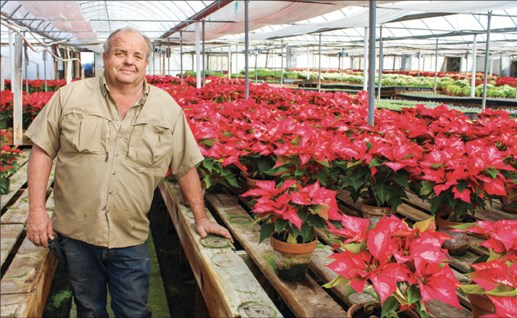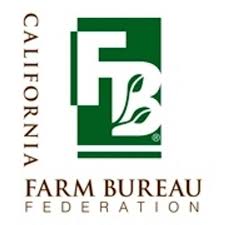
Bill Eisley looks over part of this year’s poinsettia crop in Auburn. The Eisley family is known for growing varieties other than red; the poinsettias shown here are called Ice Punch for their red-and-white leaves. Nursery operators say they expect strong sales as people stick close to home.
Photo/Kevin Hecteman
December 7, 2020 - By Kevin Hecteman - Looking for Christmas greenery? You'd better get moving. Nurseries report strong sales, as people wary of traveling during a pandemic turn to decking the halls at  home.
home.
"The poinsettias are selling really well—they're up 100% so far in sales," said Ashley Rossi of Rocklin-based Green Acres Nursery & Supply.
Red remains the predominant color, she added, with other hues steadily moving up the sales chart.
Green Acres recently acquired a facility famous for producing varied colors of poinsettias, Eisley Nursery in Auburn.
Bill Eisley, whose grandmother launched the nursery in 1932, was busy before Thanksgiving moving this year's crop out of the greenhouse.
"I'm getting 'points' ready to ship to Reno," he said the Monday before Thanksgiving. "I've already started shipping to Sacramento," with subsequent shipments headed to the Marysville and Chico areas.
Bryan Christensen, the Green Acres manager in Auburn, said the poinsettia business is "moving like it should be," but with some question marks.
"We don't know if people are going to be doing services at church, which is a large percentage of the poinsettia business," he said, although he added he thinks that might be made up elsewhere.
"A lot more families aren't traveling," Christensen said. "They're staying home, and they're going to want to decorate, which is what we're seeing across the board so far."
Poinsettias might be plentiful, but precut Christmas trees could be another story. Christensen said cut trees at the Green Acres stores have been "moving quickly."
In fact, Rossi said, the nursery might be out of trees by Dec. 12.
"The availability of trees is not there to support the growth," she said, pointing to Western wildfires among the factors affecting supply.
The general upward gardening trend that began in spring held all summer long, Rossi said, first with edible plants, then "everything else."
"I think initially, when people were at home, they were interested in planting their vegetable gardens and their victory gardens, and then they got interested in gardening on a more broad scale," Rossi said.
On the cut-flower side, Dave Pruitt, chief executive of the California Cut Flower Commission, said cut foliage used year-round in floral arrangements has found its own holiday niche, as the basis for hand-made wreaths.
"That has become a large business for this time of year," Pruitt said. "Most of the people that I talk with are basically sold out. They're selling as much as they can produce and process."
Pruitt said flower growers are trying to recover from a difficult year.
"We haven't gotten over our challenges that existed before the pandemic," he said, one of them being simply "operating a business in California."
For example, Pruitt said wholesale markets in San Francisco and Los Angeles were limited by local shelter-in-place orders.
"A lot of growers have had to pivot in terms of how they sell their product, too," he said. "We started advertising, getting growers together, finding out what changes they're going to make in distributing flowers, and getting that information out to wholesalers and retailers."
More flower growers now sell directly to retail, he noted, and more flowers are going to mass-market sellers. Some growers have gone out of business, he added, and others pared back production.
"We have had some growers that have downsized," Pruitt said. "It'll probably be a long time before they ever come back to the size they were, but they've downsized and found a level that works for them at this point. That's what's important. I don't foresee us losing anybody else."
Pruitt has also been busy winding down operations, as CCFC members have voted to shutter the commission at the end of the year. Pruitt said such a vote is taken among the commission's members every five years.
Should the CCFC ever be revived, it would look different as a result of Assembly Bill 1205 by Assemblywoman Monique Limón, D-Santa Barbara, signed into law in late September. The bill would reduce the number of board members from 13 to nine, with the number of slots reserved for cut-flower producers changing from 12 to eight. The secretary of the California Department of Food and Agriculture is authorized to call for a vote to re-establish the commission from one year after it closes.
In the commission's final weeks, Pruitt said he has directed his energies toward helping pandemic-battered flower growers access all the assistance they need.
"We've done a lot of work for getting the floral industry accepted into the (Paycheck Protection Program), and especially accepted into the (Coronavirus Food Assistance Program)," which at first did not include floral producers, he said. "They said, 'Well, we'll include you, but you need to give us information.' We had to do a lot of work to get included in those programs as cut-flower growers."
The U.S. Department of Agriculture is taking applications for the second round of CFAP, which are due Dec. 11. For more information and to apply, see www.farmers.gov/cfap.
Getting to this point has not been easy, Pruitt said.
"It's been, from the start of this pandemic, no matter what's going on, it's been an uphill battle proving that we are worthy of being called part of agriculture, worthy of being essential and worthy of receiving governmental assistance to our growers," he said.
(Kevin Hecteman is an assistant editor of Ag Alert. He may be contacted at khecteman@cfbf.com.)
Reprinted with permission: California Farm Bureau Federation








